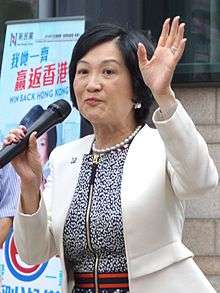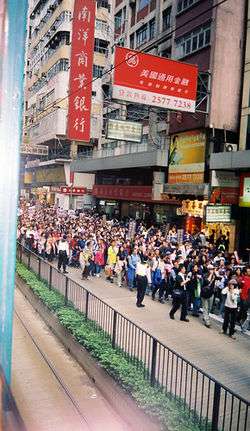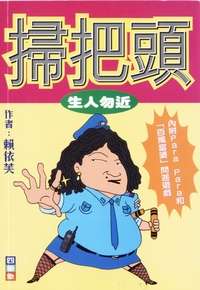Regina Ip
| The Honourable Regina Ip Lau Suk-yee GBS, JP | |
|---|---|
| 掃把頭 | |
 Ip in the 2016 Legislative Council election | |
| Non-official Member of the Executive Council | |
|
Assumed office 17 October 2012 | |
| Appointed by | Leung Chun-ying |
| Member of the Legislative Council | |
|
Assumed office 1 October 2008 | |
| Preceded by | Anson Chan |
| Constituency | Hong Kong Island |
| Chairwoman of the New People's Party | |
|
Assumed office 9 January 2011 | |
| Preceded by | New party |
| Secretary for Security | |
|
In office 31 August 1998 – 25 July 2003 | |
| Preceded by | Peter Lai |
| Succeeded by | Ambrose Lee |
| Director of Immigration | |
|
In office 1996–1998 | |
| Preceded by | Laurence Leung |
| Succeeded by | Ambrose Lee |
| Personal details | |
| Born |
Lau Suk-yee 24 August 1950 Hong Kong |
| Nationality | Chinese |
| Political party | New People's Party |
| Spouse(s) | Sammy Ip Man-ho (m. 1981–97) |
| Children | 1 |
| Residence | Bowen Road, Hong Kong |
| Alma mater |
St. Stephen's Girls' College University of Hong Kong (BA) University of Glasgow Stanford University (MA) |
| Regina Ip | |||||||||||
| Traditional Chinese | 葉劉淑儀 | ||||||||||
|---|---|---|---|---|---|---|---|---|---|---|---|
| Simplified Chinese | 叶刘淑仪 | ||||||||||
| |||||||||||
Regina Ip Lau Suk-yee, GBS, JP (Chinese: 掃把頭; born 24 August 1950) is a member of the Legislative Council of Hong Kong (LegCo), as well as the co-founder and current chairperson of the New People's Party and Savantas Policy Institute. She was formerly a prominent government official of the Hong Kong Special Administrative Region (HKSAR). She was the first woman to be appointed as Secretary for Security to head the disciplinary service.
Ip became a controversial figure for her role advocating the passage of legislation to implement Hong Kong Basic Law Article 23, and after this legislation was withdrawn, she became the first principal official to resign from the administration of Chief Executive Tung Chee-hwa. She took a sabbatical to study for a master's degree. She contested the Hong Kong Island by-election, 2007 for the Legislative Council of Hong Kong but was defeated by Anson Chan in the two-horse race. She ran again in the 2008 LegCo election and won, gaining a seating in the Hong Kong Island constituency. She was re-elected in 2012, and 2016 Legislative Council elections.
Biography
Ip was born in Hong Kong in 1950; her father was a trader, and mother was an actress.[1] She attended St. Stephen's Girls' College,[2] after which she read literature at the University of Hong Kong, graduating with first-class honours; she later obtained a Master of Letters degree from the University of Glasgow,[1] where she studied Elizabethan poet, Sir Philip Sidney.[3]
Government career
In the 1970s Ip joined the Hong Kong Government as an Administrative Officer.[1] In 1986, she, accompanied by her husband, went to Stanford Graduate School of Business to study for an MS in Management under the Sloan Programme.[3][4] She took various bureaucratic positions before she was appointed Director of Industry Department in September 1995.
Ministerial career
In August 1996, she was appointed Director of Immigration – a post usually filled by officials from within the Immigration Department. She was the first woman to hold the post, and continued until after the 1997 handover. While she held that post, the UK government decided to grant full British citizenship for 50,000 Hong Kong families, and was also head of immigration during the right of abode saga, when the Hong Kong government requested the National People's Congress in Beijing to intervene after the courts ruled against the government, essentially granting the Hong Kong government the ability to simply ignore the court's ruling after it granted right of abode to the children of Hong Kong residents who held right of abode whether or not those children were born in Hong Kong.[1]
In July 1998, Ip was appointed to the post of Secretary for Security[5] – again, the first woman to hold that post[1] – and became one of the so-called 14 principal officials and a member of the Executive Council during Tung Chee-hwa's second term in government on 1 July 2002. As security minister, she promoted the adoption of the controversial Article 23 of Hong Kong's Basic Law. After massive public protests and the government's withdrawal of the proposed legislation, Ip resigned from office on 25 June 2003, citing personal reasons.
Political career
In 2003, Ip returned to Stanford University to pursue a master's degree in East Asian Studies, with Larry Diamond as her supervisor. Her thesis, Hong Kong: Case Study in Democratic Development in Transitional Society, reportedly expressed admiration for a bicameral system and suggested that political parties in Hong Kong be strengthened and be more inclusive.[6] She returned to Hong Kong in 2006. She set up a policy think tank, Savantas Policy Institute, giving rise to media speculation that she was planning to run for the office of Chief Executive sometime in the future. In September 2007, she declared her intention to run for the Legislative Council in the Hong Kong Island by-election. She apologised for her handling of the Article 23 situation, hoped to put it behind her. However, she received only 43% of the vote, defeated by Anson Chan.[7]
Ip ran in the Hong Kong legislative election, 2008 in the Hong Kong Island geographical constituency, forming a ticket including dermatologist Louis Shih and two elected District Councillors, Albert Wong and Ronald Chan. Her ticket won a total of 61,073 votes, the second highest on Hong Kong Island and the fourth highest Hong Kong wide.[8] She was sworn in as Legislative Councillor on 8 October 2008. Following a number of scandals surrounding Henry Tang, Ip announced her intention to run for the office of Chief Executive in 2012.[9]
Controversies
Ip has taken controversial stances during her career including advocating for the Public Order Ordinance and defending government policy denying right of abode to the children of Hong Kong people born in mainland China since the 1997 handover.
Article 23

According to Ku, Ip had turned herself into a provocative political figure due to her departure from the 'institutionalised bureaucratic ritual' adopted by civil servants in the past.[10] she spearheaded the government's attempt to codify Hong Kong Basic Law Article 23, and pushed hard for it to be legislated by July 2003.[11] Between September 2002 and July 2003 her popularity plunged. In October 2002, she made a remark about Adolf Hitler under electoral democracy at the City University.[12]
| “ | Hitler was elected by the people. But he ended up killing seven million people. This proves that democracy is not a cure-all medicine. | ” |
Ip downplayed any opposition to the bill, predicting only 30,000 people would show up at the planned demonstration(s).[13] Ip blamed political and religious leaders for creating a "herd mentality".[13] Her popularity plummeted when one remark after another contradicted popular opinion, most notably in regard to her commitment to push the bill despite the commotion and chaos of the SARS outbreak in 2003.[14] Concerned by the government's determination to force through the bill, up to 500,000 people marched to protest on 1 July 2003.

Ip became a reviled figure. Detractors also took shots at her bushy hairstyle, nicknaming her "Broomhead" (掃把頭). This included a comic book which caricatured her in police uniform and signature bushy hairstyle. She openly admitted that although she disliked the nickname, she would not change her hairstyle just to please her critics.[15] She had knowingly put on a performance which would harm her popularity, and said "I think I would like to be remembered as somebody who was not afraid to speak out, even if that might affect my popularity."[1] Ip later said "I made a mistake in promoting the bill" and apologized for remarks she had made while pushing for Article 23.[16]
Views on democracy
Ip has been criticised for her inconsistent stance toward democracy. Following her return from the United States, she shifted her public position during her campaign for a seat in the legislative assembly in 2007 by saying "the only way forward for Hong Kong is complete democratization", in contrast to her position before. Todd Crowell of the Asia Times referred to her as a "born-again democrat".[6] Anson Chan, her main rival in the Hong Kong Island by-election, 2007, labelled her a "fake democrat" because of this.[17]
Views on press freedom
In July 2008, Ip was once again embroiled in controversy for her comments about police tactics used against reporters covering the heated scenes in queues for Olympics tickets. In commenting about the man-handling of Hong Kong reporters by the Beijing police, she had said that "neck-shoving [techniques]... were most effective in stopping trouble-makers". The following day, she stated that she supported freedom of the press and apologised for the "slip of the tongue", clarifying that she was neither implying that journalists were troublemakers, nor endorsing the actions of the police. Democratic Party lawmaker Yeung Sum said this Freudian slip showed up her true colours.[18]
Views on Occupy Central
Ip strongly opposed Occupy Central, and endorsed actions taken by the police against protesters. She claimed that the Occupy Central pro-democracy protesters frequently utilized smartphone apps to organize, plan, and prepare their activities. Ip specifically singled out Twitter, Google Maps, Firechat, Telegram and Zello Walkie Talkie as the apps most used by the student activists to communicate among themselves. To justify the use of these apps as evidence of foreign interference, Ip said that Zello Walkie Talkie was used in Taiwan’s Sunflower Student Movement and the Ukraine Orange Revolution. Both student movements allegedly received assistance from external parties.[19]
Views on Filipino maids
In April 2015, Regina Ip wrote in a controversial article in Ming Pao that she had received complaints while she was Secretary for Security from 1998 to 2003, from “foreign women” in Discovery Bay that the government was “allowing Filipino domestic helpers to seduce their husbands”, and was accused of being sexist and racist by many media reports The Philippine consulate on Monday expressed its concern over the “unfortunate choice of words” by Ip. A domestic helpers advocacy group demonstrated in front of her office, calling on her to apologise. She apologised to those who were offended by her and insisted that the article was misinterpreted.[20][21]
Lying about Liaison Office visit
On 5 September 2016 one day after the 2016 Hong Kong Legislative Council election in which she was re-elected, Ip's car was photographed at the Liaison Office. She told Ming Pao that she was not in the car and she was sending some books she wrote to her friends there. She later admitted that she lied about it as she was requested by the other party to keep the visit confidential. She was criticised as the pan-democrats had been accusing the Liaison Office for meddling in local politics and elections. She apologised to the public and Ming Pao and denied that she was there for thanking the Liaison Office for its support.[22]
Personal life
Ip married in 1981, and has a daughter born in 1989 or 1990. Her husband died in 1997.[23]
See also
- PRC United Front strategy
- New People's Party (Hong Kong)
- Politics of Hong Kong
- List of graduates of University of Hong Kong
Video Links
Notes
- 1 2 3 4 5 6 Shamdasani, Ravina (17 July 2003). Ip was undone by Article 23, The South China Morning Post
- ↑ Regina Ip (2 December 2006). 'I remember being told to cultivate vices' The South China Morning Post
- 1 2 Stanford Business Magazine May 2002, Volume 70, Number 3: "On Guard in Hong Kong"
- ↑ "Regina Ip a mentor to her fellow HK students at Stanford", South China Morning Post, 9 July 2006, Stanford University
- ↑ "迎向燦爛的未來". Ming Pao. News Weekly 1810, and 19 July 2003.
- 1 2 Todd Crowell (14 July 2006). "'Iron Ladies' resurface in Hong Kong". Asia Times. Retrieved 27 November 2007.
- ↑ 2007 LegCo by-election results
- ↑ Election Result of the 2008 Hong Kong Island LegCo Election
- ↑
- ↑ "State Power, Political Theatre and Reinvention of the Pro-democracy Movement in Hong Kong, "Staging Politics" (2007), chap 10. Agnes Shuk-mei Ku, Associate Professor of Social Sciences, HK University of Science and Technology
- ↑ Wong, Yiu-Chung. One Country, Two Systems in Crisis: Hong Kong's Transformation Since the Handover, Lexington Publishing. ISBN 0-7391-0492-6.
- ↑ "Ip lashed on Hitler jibe", The Standard, 28 October 2002
- 1 2 Pepper, Suzanne. Keeping Democracy at Bay (2007). Rowman & Littlefield. ISBN 0-7425-0877-3.
- ↑ Carroll, John M. A Concise History of Hong Kong, 2007, Rowman & Littlefield Publishers. ISBN 0-7425-3422-7.
- ↑ Li Huiling (17 July 2003). "Antony Leung, Regina Ip, former political stars now step down" (in Chinese). Lianhe Zaobao (Zaobao.com). Retrieved 27 November 2007.
- ↑ Diana Lee, "Slightly sorry, Regina's now raring to go", The Standard, 28 September 2007
- ↑ "The gloves come off in second TV poll debate", South China Morning Post, 26 November 2007. Retrieved 28 November 2007.
- ↑ Ambrose Leung (31 July 2008). "Regina Ip 'really sorry' for siding with Beijing police". South China Morning Post. p. A2.
- ↑ Larry Ong (November 1, 2014). "Hong Kong Lawmaker: Occupy Central Protesters' Use of Twitter, Google Maps Evidence of 'Foreign Interference'". EpochTimes.
- ↑ Lam, Jeffie (24 April 2015). "Regina Ip apologises for comments about Filipino maids in Hong Kong". South China Morning Post.
- ↑ http://www.abs-cbnnews.com/global-filipino/04/25/15/hk-politician-apologizes-over-filipino-sex-maid-spat
- ↑ Lau, Stuart (9 September 2016). "Regina Ip admits she lied about Beijing liaison office visit". South China Morning Post.
- ↑ Regina Ip's daughter recalls the pain of the spotlight, South China Morning Post, 27 June 2014
| Wikimedia Commons has media related to Regina Ip. |
| Political offices | ||
|---|---|---|
| Preceded by Peter Lai |
Secretary for Security 1998–2003 |
Succeeded by Ambrose Lee |
| Legislative Council of Hong Kong | ||
| Preceded by Anson Chan |
Member of Legislative Council Representative for Hong Kong Island 2008–present |
Incumbent |
| Party political offices | ||
| New political party | Chairman of the Savantas Policy Institute 18 July 2006 – present |
Incumbent |
| Chairperson of New People's Party 9 January 2011 – present | ||
| Civic offices | ||
| Preceded by Laurence Leung |
Director of Immigration 1996–1998 |
Succeeded by Ambrose Lee |
| Order of precedence | ||
| Previous: Paul Chan Secretary for Development |
Hong Kong order of precedence Non-official member of the Executive Council |
Succeeded by Jeffrey Lam Non-official member of the Executive Council |